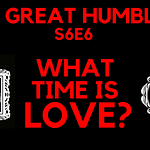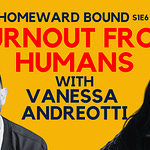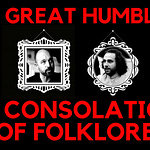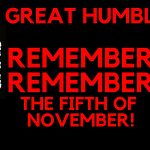In this episode Dougald and Ed explore the ‘bestiary’ of metaphors stalking this time, the creatures of our imaginations, we are walking with beasts – black elephants, green swans, impossible hamsters – and nightingales.
‘Will there be singing in the dark times. Yes, there will be singing about the dark times’
Bertolt Brecht 1939
We begin by revisiting a quote from Astronomer Royal, Martin Rees in 2015:
‘It is imperative to guard against the downsides of such an interconnected world...The magnitude of the societal breakdown from pandemics would be far higher than in earlier centuries. English villages in the 14th century continued to function even when the Black Death almost halved their populations. In contrast, our social framework would be vulnerable to breakdown as soon as hospitals overflowed and health services were overwhelmed—which could occur when the fatality rate was still a fraction of 1 per cent.’
And note that in these supposedly ’unimaginable futures’, Wimbledon Tennis Tournament has been quietly paying a £1M annual pandemic insurance premium for 17 years which has just paid out £100M
This week’s negative oil prices reinforce the idea that almost every day these days is another previously unthinkable ‘thought experiment’. As Lenin said ‘There are decades where nothing happens, and there are weeks where decades happen’
Dougald takes us back to 2011, when it was “kicking off everywhere” – the giddiness of those times when it was felt that what might lie ahead “can’t be any worse than going back to normal”. But Vinay Gupta warned ‘A much, much worse world is possible’.
We look at ‘supply chain weirdness’ and the vulnerability of water purification systems to a shortage of chemicals, industrial carbon dioxide ironically and consider Stephen Jenkinson’s – ‘Stranger Days’ – a sobering voice – and ‘the instinct to get on the other side is a traumatised instinct’, to rush forward into relief, even to do it imaginatively by dwelling in the beautiful possibilities of another world. This can be an escape from dwelling with the trauma of the world we’re in right now – so what’s the alternative? To sit with the discomfort, sit through it, and a humbler kind of hope:
'Do I think we’re going to seize this moment as a collective and seize the moment? I doubt it. Is it there to be seen anyway? Yes, it is… little pockets of sanity and lucidity that aren’t seduced by the old seduction of getting back on with our lives…’ and those pockets might play a disproportionate role, they might be the source of inspiration in times to come.
Ed explores the idea that ‘the unknown may hold more value than the known’ and the notion of ‘UNLEARNING’ in which resist the lure and pull of the familiar - even though it feels comforting in uncertainty. We discuss Marion Waller, adviser to the Mayor of Paris on ‘tactical urbanism’ (rapid experimental change using PEOPLE) and the metaphor of cities as forests not machines - is this part of the role of metaphors - the space for playfulness?
‘But what is a metaphor?’ asks Dougald. Why are they so powerful? They re not like a crossword clue with a one-to-one solution – they arer tools for working with the unknown, that can’t be fully known/controlled. Dark Mountain as a name, created an image with unanticipated possibilities.
Ed takes us on a whistle-stop tour of the metaphors whirling around us right now:
Phoebe Tickell’s ‘Moral Imaginations’ train metaphor:
“we’ve been on a train that has been hurtling towards a cliff-edge, an irreversible cliff-edge — once we’re off that cliff there’s no way of re-winding that train or stopping the train once we’re off the cliff-edge those systems are in play (and she’s obviously referring to climate change). And it’s as if we’ve basically had a fire in one of the carriages, and it’s made us stop the train. And suddenly we’ve looked outside and we’ve asked: why are we on a train that is hurtling towards that cliff-edge? We need to stop the train.” (ref. E M Forster - The Machine Stops in Episode 2)
The boat metaphor: ‘We’re all facing the same storm...but in very different boats’
The WAR metaphor is EVERYWHERE, the news narrative can feel like an action movie. ‘The Frontline’ (victimhood, sacrifice, fodder for forces greater than yourself, military logistics, command and control planning, ’clapping the troops’, PPE crisis is like weapons without ammunition). But is the language of war misplaced? ‘No one is trying to kill each other here, arguably the world is saner right now’ (Liz Gilbert)
Fake News/Telecoms metaphor - ‘interrupting transmission’ or ‘communicating bad messages’
The Italian Job. Is this scene the ULTIMATE representation of the economic recovery in lockdown? https://www.youtube.com/watch?v=HZCaSyid4m0 (suggested by Ed Dowding)
SPACESHIP EARTH - Buckminster Fuller (Ellen MacArthur), world as machine without operating instructions, no passengers only crew
Dougald explores why that Spaceship Earth metaphor had a massive influence on the environmental movement via Stewart Brand and refers to an interesting moment in the Jenkinson recording, musing on the virus and this moment as “replacing the Earth seen from space with the Earth seen from Earth”, which feels humbling, echoing something Ivan Illich almost says in the closing pages of ‘Deschooling’, getting to the moon was the easy part, it’s finding our way home again that’s the real work.
Ed Introduces the ‘Bestiary of Metaphors’
Black swans (unforeseen, game-changing, rationalised in hindsight)
White swans - grimly predictable (climate)
Green swans - John Elkington - exponential, regenerative business?
Dougald brings in THE BLACK ELEPHANT – Collapsonomics story (link here)
Ed replies with the Black Jellyfish – we think we know/understand something superficially simple, that is actually far more complex, with a nasty sting in tail
THE IMPOSSIBLE HAMSTER (Leo Murray)...none of us is safe - from the impossible hamster (no one expects this!)! We are walking with beasts, metaphor isn’t supposed to be safe, it is dangerous and subversive, things come out you’re not expecting, this is about being beyond control
‘None of us is safe...until all of us are safe’
To which Dougald responds: none of us is safe, full stop, citing Helen Keller’s grounded hope, not traumatised hope:
‘Security is mostly a superstition. It does not exist in nature, nor do the children of men as a whole experience it. Avoiding danger is no safer in the long run than outright exposure. Life is either a daring adventure, or nothing.’
Wouldn’t it be something... if whatever pockets we may have a hand in, whatever we may get to take responsibility for in the unknown world that lies ahead, it could be grounded in that spirit...











